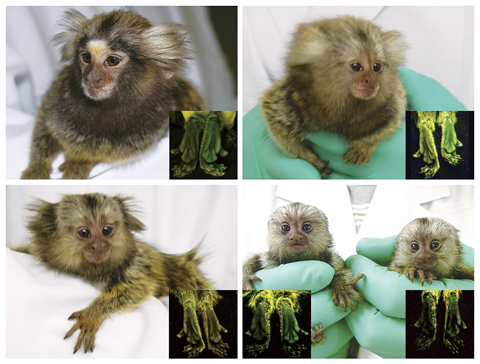They sound more like a Victorian freak show than science, but researchers say that glow-in-the dark monkeys created in a Japanese lab could be a breakthrough in treating human inherited diseases.
The monkeys were given a gene from a jellyfish and, significantly, it was inherited by their young — the first time a genetically modified animal has passed such genes down a generation. Researchers said it was major step towards understanding Parkinson’s and motor neurone disease.
Animal rights groups fear it could mean more primates are used in research labs. It also raises the possibility of genetically modifying humans, although such work is illegal in Britain and in most countries.

PHOTO: REUTERS
Erika Sasaki and her team at the Central Institute for Experimental Animals in Kawasaki, Japan, added a gene to marmoset embryos that made them glow green under ultraviolet light. The embryos were transferred into surrogate females, and produced five live births.
All carried the green gene somewhere in their bodies, and two passed it to offspring. Last month, a male was born using sperm from one monkey called Kou, and two more glowing marmosets have been born since. One died after being bitten by its mother. All are healthy, and do not glow under normal lighting.
The scientists plan to create families of monkeys that develop neuro-degenerative diseases.
“Our method promises to be a powerful tool for studying the mechanisms of human diseases and developing new therapies,” they wrote in the journal Nature.
But an accompanying editorial warns it “promises to raise the stakes” over animal rights by “intentionally introducing a harmful gene into the primate gene pool.”
Genetically modified mice are often used to learn about human diseases, but in some cases primates will be more informative.
“This is potentially very exciting,” said Kieran Breen of the Parkinson’s Disease Society. “Because primates are much closer to humans than mice, we’ll have a new animal model to work with.”
Aside from whether the technique can indeed recreate human-type diseases, a European directive may prohibit use of primates in such research. Vicky Robinson, of NC3Rs, which campaigns to reduce use of animals, said: “We can’t assume a transgenic marmoset will be better for disease research than, for example, a transgenic mouse. Any researcher will need to show the added scientific value of using a monkey outweighs the significant ethical considerations accompanying its use.”

POLITICAL PRISONERS VS DEPORTEES: Venezuela’s prosecutor’s office slammed the call by El Salvador’s leader, accusing him of crimes against humanity Salvadoran President Nayib Bukele on Sunday proposed carrying out a prisoner swap with Venezuela, suggesting he would exchange Venezuelan deportees from the US his government has kept imprisoned for what he called “political prisoners” in Venezuela. In a post on X, directed at Venezuelan President Nicolas Maduro, Bukele listed off a number of family members of high-level opposition figures in Venezuela, journalists and activists detained during the South American government’s electoral crackdown last year. “The only reason they are imprisoned is for having opposed you and your electoral fraud,” he wrote to Maduro. “However, I want to propose a humanitarian agreement that

Young women standing idly around a park in Tokyo’s west suggest that a giant statue of Godzilla is not the only attraction for a record number of foreign tourists. Their faces lit by the cold glow of their phones, the women lining Okubo Park are evidence that sex tourism has developed as a dark flipside to the bustling Kabukicho nightlife district. Increasing numbers of foreign men are flocking to the area after seeing videos on social media. One of the women said that the area near Kabukicho, where Godzilla rumbles and belches smoke atop a cinema, has become a “real

‘POINT OF NO RETURN’: The Caribbean nation needs increased international funding and support for a multinational force to help police tackle expanding gang violence The top UN official in Haiti on Monday sounded an alarm to the UN Security Council that escalating gang violence is liable to lead the Caribbean nation to “a point of no return.” Special Representative of the UN Secretary-General for Haiti Maria Isabel Salvador said that “Haiti could face total chaos” without increased funding and support for the operation of the Kenya-led multinational force helping Haiti’s police to tackle the gangs’ expanding violence into areas beyond the capital, Port-Au-Prince. Most recently, gangs seized the city of Mirebalais in central Haiti, and during the attack more than 500 prisoners were freed, she said.

DEMONSTRATIONS: A protester said although she would normally sit back and wait for the next election, she cannot do it this time, adding that ‘we’ve lost too much already’ Thousands of protesters rallied on Saturday in New York, Washington and other cities across the US for a second major round of demonstrations against US President Donald Trump and his hard-line policies. In New York, people gathered outside the city’s main library carrying signs targeting the US president with slogans such as: “No Kings in America” and “Resist Tyranny.” Many took aim at Trump’s deportations of undocumented migrants, chanting: “No ICE [Immigration and Customs Enforcement], no fear, immigrants are welcome here.” In Washington, protesters voiced concern that Trump was threatening long-respected constitutional norms, including the right to due process. The